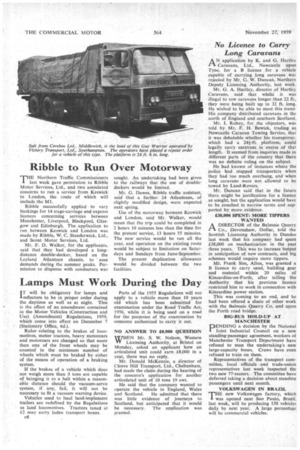Lamps Must Work During the Day
Page 46

If you've noticed an error in this article please click here to report it so we can fix it.
IT will be obligatory for lamps and reflectors to be in proper order during the daytime as well as at night. This is the effect of an amendment contained in the Motor Vehicles (Construction and Use) (Amendment) Regulations, 1959, which come into effect on December 7 (Stationery Office, 6d.).
Rules relating to the brakes of locomotives, motor tractors, heavy motorcars and motorcars are changed so that more than one of the front wheels may be counted in the minimum number of wheels which must be braked by either of the means of operation of a braking system.
If the brakes of a vehicle which does not weigh more than 3 tons are capable of bringing it to a halt within a reasonable distance should the vacuum-servo system, if any, fail, it will not be necessary to fit a vacuum warning device.
Vehicles used to haul land-implement trailers are redefined by the Regulations as land locomotives. Tractors taxed at :E2 may carry laden transport boxes.
c6 Parts of the 1955 Regulations will not apply to a vehicle more than 10 years old which has been submitted for examination under the Road Traffic Act, 1956, while it is being used on a road for the purposes of the examination by someone authorized to carry it out.
NO ANSWER TO 18,080 QUESTION
WHEN Mr. S. W. Nelson, Western Licensing Authority, at Bristol on Monday, asked an applicant how an articulated unit could earn £8,000 in a year, there was no reply.
Mr. Donald McKenzie, a director of Cleeve Hill Transport, Ltd., Cheltenham, had made the claim during the hearing of the concern's application for another articulated unit of 10 tons 19 cwt.
He said that the company wanted to operate the vehicle in England, Wales and Scotland. He admitted that there was little evidence of journeys to Scotland, but anticipated that it would be necessary. The application was granted.
















































































































